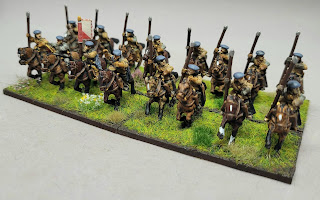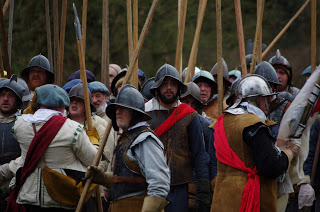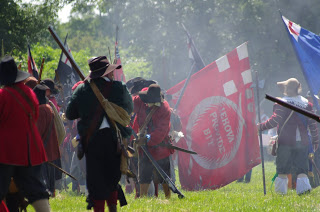Major General Sir John Brown of Fordell's Regiment of Horse
Apologies for a not-Monday posting! So here without further ado is Major General Sir John Brown of Fordell's Regiment of Horse
Sir John Brown learnt his soldiering on the continent, and was commissioned as one of the first three cavalry troop commanders of the Solemn League and Covenant (he would later receive a commission to be lieutenant colonel of Leslie's Horse).
In May 1645, Brown was commissioned colonel of his own Regiment, which was to be made up of four troops. This was quickly amended by the Committee with the Army who raised the Regiment's strength to eight troops.
The newly formed Regiment would be quartered in Cumbernauld. In October 1645 the Royalist Northern Horse were retreating from Yorkshire, and attempting to head north to join up with Montrose's Army. Brown's Horse met the Northern Horse at Annan Moor.
Brown's men routed the Royalist reserve line (commanded by Langdale) which in turn led the front line (commanded by Digby) to flee. Brown's men killed 60 officers and 100 men; capturing 200 men; and taking the Royalist colours. The Northern Horse fled to the Lake District, losing more men along the route. The King would not try again to reinforce Montrose's Army.
The Regiment would march south to Newark before the year was out; where they would join the siege, remaining until the town fell in May 1646.
Once Newark had surrendered they'd would return north to Cumberland. They were refused quarters by the Yorkshire County Committee, the Regiment would be disbanded in February 1647.
Brown would take command of a Troop in the Scots New Model Army. As he opposed the Engagers, command of the Troop was passed to the Earl of Callendar. Under Callendar the Troop took part in a skirmish at Mauchline Muir, before they were disbanded after the Treaty of Stirling.
In February 1649 Brown would be commissioned as colonel of the Perthshire Horse. During 1650 a number of scandals rocked the Regiment: Brown was not impressed with the presence of a number of former Engagers, including a cornet, in the Regiment (Brown was one of those who presented the West Kirk Declaration* to the Committee of Estates); and a trooper fathered a child out of wedlock, he was tried for bastardy and he would eventually confess to the crime.
By September the Perthshire Horse would be serving with Leslie: Brown would argue with Leslie about fighting at Dunbar, but none the less they would take the field. Leslie's Army was defeated and Brown's men were able to flee the battlefield, making their way to Stirling. The English would incorrectly claim, in propaganda, that Brown had been captured.
Middleton's rising in the North meant that the Regiment would be ordered to quell this rising. Brown attempted parlay, requesting Middleton's surrender. Middleton attacked first with half his force, defeating Brown.
Yet more scandal hit the Presbytery Courts - another of Brown's men had fathered a child out of wedlock. As the Courts investigated, they learned that the man had been killed at Dunbar
In May 1651 Brown made commander of the 3rd Cavalry Brigade, which consisted of three regiments. At Inverkeithing, Brown was commander of the Scottish Horse. Brown would be wounded, and be captured. He would die in captivity in Leith, not long after.
What remained of the Regiment would regroup under command of Sir Arthur Forbes, and set off north from Angus at the end of August, from where they dispersed.
I've chosen to represent them as lancers, even though there is evidence of them being issued pistols, and "back, breast and head pieces" after Annan Moor. I've given them buff coats, and a few troopers are wearing 'trained band buff' over hodden grey coats. As there is no PP Scots horse command pack I have converted some command figures from my spares box and made them Scottish by giving them a blew bonnet and painting them grey.
Cornet as always, from Maverick Models. One of a ridiculous number of flags that Stuart has produced for me. Many of the Scots flags aren't listed on his website, but if you ask him nicely I'm sure he'll dig them out for you.
*West Kirk Declaration basically condemned Charles (later Charles II) for threatening peace and the Godly order of the world by continuing the struggle against the government. In other words, they wanted the Engagers out of the army.














I am a regular reader, that must make three :)
ReplyDeleteAs always I must say really enjoy the background you include with the excellently painted miniatures.
I think, in reality, that the number of regular readers may be up to five, or even six.
DeleteGlad you enjoy the blog, and thank you for your kind
...words
DeleteRegular reader seven. We need to start our own regiment, colours..
ReplyDeleteAlready counted you Haydn. Not reached the heady heights of seven yet 😉
DeletePlus, I think we can be confident that our coat colours and flag will be authentic! Right!?
DeleteI think a public information clarification is needed. An internet search quickly confuses Maverick Models (wargames flags) with Maverick Models (representing female and male faces in the fashion industry since 2003). Some very close scrutiny of the latter website was needed just to verify the two companies are not the same.
ReplyDeleteAbsolutely. Please surf the internet responsibly.
DeleteResponsible people there's a 'safe' link somewhere on the left of the page, or hidden away top left (if phone browsing).
If you are a 'dangerous Dave' then Google is your friend.
Another cracking looking unit, with my favourite cornet of the wars as it is relatively easy to recreate. The unit certainly had a colourful time, and it sounds like they were possibly popular with the ladies.
ReplyDeleteThanks FoGH.
DeleteCertainly some immorality within the ranks. Although reading the court records through 21st Century glasses does leave you shaking your head rather a lot.